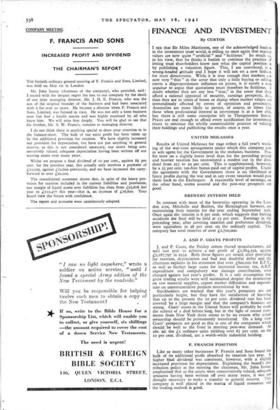FINANCE AND INVESTMENT
By CUSTOS
I SEE that Sir Miles Mattinson, one of the acknowledged leader' in the investment trust world, is telling us once again that market values are now quite "artificial" and "fictitious." So much so, in his view, that he thinks it foolish to continue the practice of letting trust shareholders know just what the capital position is by publishing a valuation figure. This, I am convinced, is a wrong-headed attitude and I hope it will not set a new fashion for trust directorates. While it is true enough that markets are now very " thin " in the sense that only a little buying or selling exerts a disproportionate influence on prices, it is surely a no sequitur to argue that quotations must therefore be fictitious. I doubt whether they are any less "true," in the sense that they afford a rational appraisal of security, earnings prospects, Szc., than they are in times of boom or slump when market values are tremendously affected by errors of optimism and pessimism. Anomalies are more likely to persist, of course, in times like these when professional interest in investment is at a low ebb, but there is still some enterprise left in Throgmorton Street. Prices are real enough to afford every justification for investment trusts to continue the wholly commendable practice of valuing their holdings and publishing the results once a year.
UNITED MOLASSES
Results of United Molasses for 1940 reflect a full year's work- ing of the war-time arrangement under which this company acts as sole agent for the Government in the molasses business. Pro- fits were on a slightly lower level than for the preceding period and heavier taxation has necessitated a modest cut in the divi- dend from 224 to zo per cent. This is supplemented, however, by a 24 per cent, tax-free bonus paid out of capital profits. Under the agreement with the Government there is no likelihood of fancy profits during the war and in any event taxation would pass them back to the Exchequer. A reasonable level of earnings, on the other hand, seems assured and the post-war prospects are good.
BREWERY INTERIM HELD
In contrast with most of the breweries operating in the Lon- don area, Mitchells and Butlers, the Birmingham brewers, are maintaining their interim for the year ending September 30th. Once again the interim is 8 per cent, which suggests that barring accidents the final will be held at 13 per cent. Earnings in the preceding year, after covering taxation and preference dividend, were equivalent to 28 per cent, on the ordinafy capital. The company has total reserves of over £2,700,000.
J. AND P. COATS PROFITS
J. and P. Coats, the Paisley cotton thread manufacturers, did well last year to achieve a net profit of £5,884,352, against £2,187,797 in 1939. Both these figures are struck after providing for taxation, depreciation and bad and doubtful debts and the chairman explains in his statement that over kfioo,000 for E.P.T., as well as further large sums for increased income tax, A.R.P. expenditure and compulsory war damage contribution, were charged against last year's profits. It is a safe assumption that gross trading results were well maintained despite the restrictions on raw material supplies, export market difficulties and expendi- ture on ,unremunerative projects necessitated by war.
Stockholders are warned that this year's prospects are not particularly bright, but they have the satisfaction of knowing that up to the present the JO per cent, dividend rate has been covered by a large margin and that the company's finances are strong. Coats' assets in the United States will probably be made the subject of a deal before long, but in the light of recent state- ments from New York there seems to be no reason why actual ownership should be permanently transferred. On a long view Coats' prospects are good as this is one of the companies which should be well to the front in meeting post-war demand. At 26s. 9d. the LI ordinary units yielding over 6-1 per cent. on the so per cent. dividend, are a worth-while industrial holding.
F. FRANCIS POSITION Like so many other businesses F. Francis and Sons found the bulk of its additional profit absorbed by taxation last year. A higher final dividend was consistent, however, with a slightly increased provision for depreciation. Explaining the board's dis- tribution policy at the meeting the chairman, Mr. John Ismay, emphasised that as the assets were conservatively valued, adequate amounts having been written off over many years, it was not thought necessary to make a transfer to general reserve. 'I his company is well placed in the matt qr of liquid resources and the trading outlook is good.


























 Previous page
Previous page